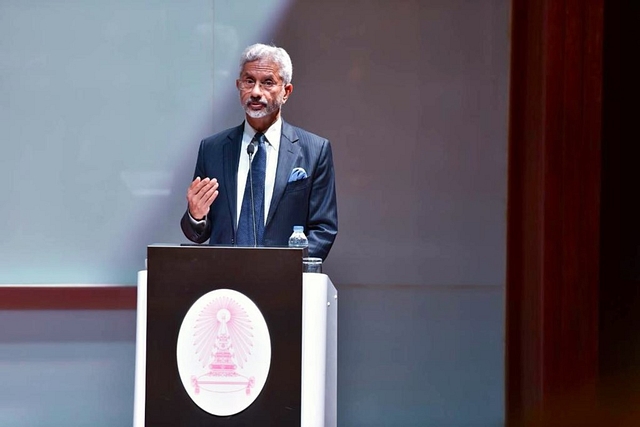
India Envisages Free, Open, Inclusive And Peaceful Indo-Pacific Built On Rules-Based Order: EAM S Jaishankar
Bangkok, Aug 18 (PTI) India envisages a free, open, inclusive and peaceful Indo-Pacific built on a rules-based order, sustainable and transparent infrastructure investment, External Affairs Minister S Jaishankar said Thursday as he emphasised on mutual respect for sovereignty, amid China flexing its muscles in the strategic region.
Delivering a lecture on 'India's Vision of the Indo-Pacific' at the prestigious Chulalongkorn University here, Jaishankar also said that Quad - comprising the US, India, Japan and Australia - is the most prominent plurilateral platform that addresses contemporary challenges and opportunities in the Indo-Pacific.
'We envisage a free, open, inclusive, peaceful, and prosperous Indo-Pacific region built on a rules-based international order, sustainable and transparent infrastructure investment, freedom of navigation and over-flight, unimpeded lawful commerce, mutual respect for sovereignty, peaceful resolution of disputes, as well as equality of all nations,' the minister said.
India envisages the Association of Southeast Asian Nations (ASEAN) to be at the centre of the Indo-Pacific, both literally and substantively, Jaishankar told the gathering which included members of Thai academia - researchers, scholars, think-tanks and students.
'Our ASEAN partners will surely note that our interactions with them have grown, not reduced, as a result of the Indo-Pacific,' he said.
China is engaged in hotly contested territorial disputes in both the South China Sea and the East China Sea. China claims sovereignty over all of the South China Sea. Vietnam, Malaysia, the Philippines, Brunei and Taiwan have counter claims.
Beijing has also built up and militarised many of the islands and reefs it controls in the region. Both areas are stated to be rich in minerals, oil and other natural resources and are also vital to global trade.
Chinese and Indian troops are engaged in prolonged standoff in Eastern Ladakh. The two sides have so far held 16 rounds of Corps Commander Level talks to resolve the standoff which erupted on May 5, 2020, following a violent clash in the Pangong lake areas.
The US, Japan, India and Australia had in 2017 given shape to the long-pending proposal of setting up the 'Quad' or the Quadrilateral coalition to counter China's aggressive behaviour in the Indo-Pacific region.
The US says Quad is not an alliance but a grouping of countries driven by shared interests and values and interested in strengthening a rules-based order in the strategically-important Indo-Pacific region.
Addressing the gathering, Jaishankar said that Quad is the most prominent plurilateral platform that addresses contemporary challenges and opportunities in the Indo-Pacific.
'We are confident that the entire Indo-Pacific region will benefit from its activities. And that is validated by the growing recognition of its importance in the international community. If there are reservations in any quarter, these stem from a desire to exercise a veto on the choices of others. And possibly a unilateralist opposition to collective and cooperative endeavours,' he said.
'India-Myanmar-Thailand Trilateral Highway that has the potential of creating a completely new axis of economic activity in Asia. Has had its fair share of challenges but we are determined to bring it to an early conclusion,' he said.
He said the prospects for the global order depend on a more equitable and democratic distribution of power and resources.
'The world must be more multi-polar. Such a multi-polar world must necessarily have a multi-polar Asia at its centre. This will happen only if we Asian countries consolidate our independence and expand our freedom of choice,' he added.
Jaishankar also addressed the changes in the landscape, the updated capabilities of players, and the importance of safeguarding the global commons.
'Recognise that a very substantial part of India's interests now lie towards the East, beyond the Indian ocean and into the Pacific. A more collaborative outlook that transcends the orthodoxy of earlier theatres is the need of the day,' he said.
This is about recognising the realities of globalisation and the consequences of re-balancing, he added. 'Only those whose mindsets are built around spheres of influence and uncomfortable with the democratization of world affairs will dispute the Indo-Pacific today.' Jaishankar, who arrived here on Tuesday, co-chaired the 9th India-Thailand Joint Commission Meeting with his Thai counterpart and Deputy Prime Minister Don Pramudwinai on Wednesday during which they discussed advancing bilateral contacts in political, economic, security and defence, connectivity and health domains.
(This story has been published from a wire agency feed without any modifications to the text. Only the headline has been changed.)